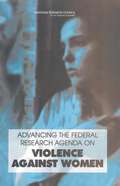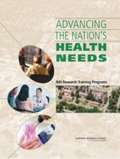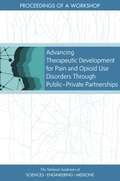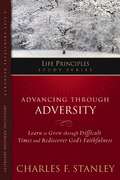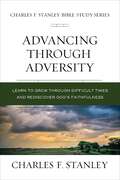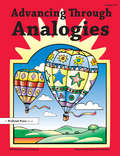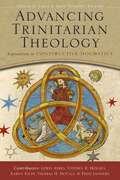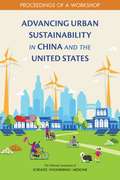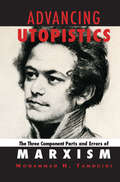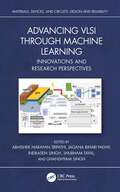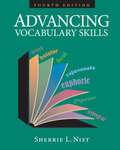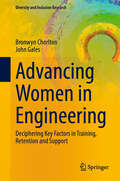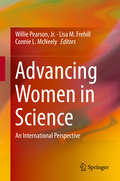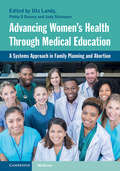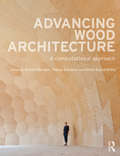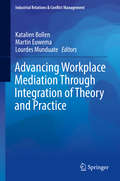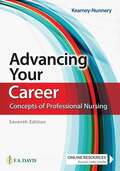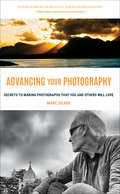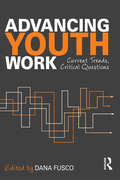- Table View
- List View
Advancing The Federal Research Agenda On Violence Against Women
by Steering Committee for the Workshop on Issues in Research on Violence Against WomenThis report expands on the work of an earlier National Research Council panel whose report, Understanding Violence Against Women, was published in 1996. The report is based on the presentations and deliberations of a workshop convened in January 2002, at the request of Congress, to develop a detailed research agenda on violence against women. While some of the research recommendations in the earlier report have been funded and carried out, the workshop demonstrated that important gaps remain. For example, prevalence and incidence data are still inadequate to measure trends or to reveal whether interventions being designed under federal programs are, in fact, working. Among its primary recommendations, the committee underscored the importance of strengthening the data and research infrastructure in this area, especially the need for better prevalence data and longitudinal data to determine the causes of violent victimization of women and the impact of interventions.
Advancing The Nation's Health Needs
by Committee for Monitoring the Nation's Changing Needs for Biomedical Behavioral Clinical PersonnelThe National Institutes of Health’s role in supporting research has long been recognized as a major factor in advancing the health needs in the nation and the world. The National Research Council was charged with the responsibility of periodically assessing the National Institutes of Health’s National Research Service Awards program, thus this book is the twelfth edition in the series. While the National Research Service Awards program now supports only a fraction of the training in the biomedical, clinical, behavioral, and social sciences, it sets a high standard for the training in all doctoral programs in these fields. Also included are the training needs of oral health, nursing, and health services research. This book has been broadly constructed to take into account the rapidly evolving national and international health care needs. The past and present are analyzed and predictions with regard to future needs are presented.
Advancing Therapeutic Development for Pain and Opioid Use Disorders Through Public-Private Partnerships: Proceedings Of A Workshop
by Engineering Medicine National Academies of SciencesChronic pain is one of the most prevalent, costly, and disabling health conditions in the United States. Estimates show that more than 11 percent of the American population suffer from chronic pain, yet the federal pain research investment has been minimal. In parallel with a gradual increased recognition of the problems of treating chronic pain, the opioid epidemic has emerged as a growing public health emergency. The intersection of these two crises lies in the fact that an unintended consequence of treating pain has been an increasing number of opioid prescriptions and diversion of drugs for illicit purposes. In May 2017, the National Institutes of Health (NIH), and the National Institute on Drug Abuse announced a public–private partnership to develop solutions to the opioid crisis and cut in half the time it takes to develop non-addictive analgesics. To advance the planning of NIH’s anticipated public–private partnerships, the National Academies’ Forum on Neuroscience and Nervous Systems Disorders hosted a public workshop that brought together a diverse group of stakeholders from academia, federal agencies, advocacy organizations and companies developing therapeutics for pain and opioid use disorders. Participants discussed potential strategies to accelerate development of non-addictive pain medications and treatments for opioid use disorders. This publication summarizes the presentations and discussions from the workshop.
Advancing Through Adversity: Advancing Through Adversity (Charles F. Stanley Bible Study Ser.)
by Charles F. StanleyGod has a plan and a purpose for you, and He can turn things to good regardless of the situation you face. These two key principles, rooted in Scripture and evidenced in the lives of Christians throughout the ages, must color the lenses through which you view adversity. In Advancing Through Adversity, Charles Stanley provides a new perspective on adversity. You'll learn which questions to ask and what lessons can be learned from adversity. Understanding God's role and bolstering your courage can help you advance through adversity rather than be overcome by it. The Life Principles Study Guides are perfect companions to Dr. Stanley's Life Principles Bible or for use on their own. They are a unique approach to Bible study, incorporating biblical truth, personal insights, emotional responses, and a call to action. Whether you use a study in a group or as an individual, it will help you get in touch with the Bible, God, and yourself.
Advancing Through Adversity: Rediscover God's Faithfulness Through Difficult Times (Charles F. Stanley Bible Study Series)
by Charles F. StanleyWhy does God allow adversity?God has a plan and a purpose for each of us, and He can turn things to good regardless of the situation we face. These two key principles—rooted in Scripture and seen in the lives of Christians throughout the ages—should color the lenses through which all followers of Christ view adversity.In Advancing Through Adversity, Dr. Charles Stanley provides a new perspective on the trials we face, revealing what questions to ask and what lessons can be learned from such times. Understanding God's role and bolstering our courage can help us advance through adversity rather than be overcome by it.With over 1 million copies sold, the Charles F. Stanley Bible Study Series is a unique approach to Bible study, incorporating biblical truth, personal insights, emotional responses, and a call to action.Each study draws on Dr. Stanley's many years of teaching the guiding principles found in God's Word, showing how we can apply them in practical ways to every situation we face. This edition of the series has been completely revised and updated and includes two brand-new lessons from Dr. Stanley.Each of the twelve lessons includes:Overview: A brief look at what is covered in the lesson.Life's Questions: A teaching from Dr. Stanley that unpacks the topic of the lesson.Living the Principle: Application and Bible study questions based on the key points.Reflection: Key takeaways to put into practice today and tomorrow.
Advancing Through Analogies: Grades 5-8
by Lynne ChathamYou can easily build your students' critical thinking and vocabulary skills with these fun analogy activities. Teaching students to solve analogies not only develops analogical thinking, but it also helps students learn and apply vocabulary skills. An analogy is a comparison between two things. It points out the similarities or likenesses between things that might be different in all other respects.The exercises included in this resource not only build thinking skills and make students more flexible and analytical, but they also enhance vocabulary and writing skills. Each illustrated page presents several analogy types along with examples of each type. Review pages give students an opportunity to identify and then solve a variety of analogies. The activities in this book will challenge students to think more critically and apply advanced vocabulary.This book introduces 16 different types of analogies, including: synonyms (calm : serene),part to whole (ring : jewelry),place or location (Peru : South America),cause and effect (fire : smoke),action to object (cut : scissors), andcharacteristics (ruby : red). These challenging activities are perfect for teaching analytical thinking, enhancing vocabulary, and improving writing skills. Advancing Through Analogies is the most advanced book in a series from Prufrock that introduces analogies to young thinkers. While the activity books in the series for younger students emphasize visual and symbolic analogies, this book for older students emphasizes verbal analogies. For easier analogies, see Thinking Through Analogies, Analogies for the 21st Century, Analogies for Beginners, and First Time Analogies. Grades 5-8
Advancing Trinitarian Theology: Explorations in Constructive Dogmatics (Los Angeles Theology Conference Series)
by ZondervanAn Exploration of Different Issues in the Doctrine of the Trinity. Throughout the last century, theologians gave great attention to the doctrine of the Trinity, and they largely succeeded in restoring it to a central place in Christian thought. But as they highlighted the novelty of the revolutionary new trinitarianism, a number of generalizations crept into the discussion that requires a careful reevaluation of the classical tradition.Trinitarian Theology—the subject of the second annual Los Angeles Theology Conference—sought to make constructive progress in the doctrine of the Trinity by aligning the trinitarian revival with the ongoing task of retrieving the classical doctrine of the Trinity.The nine diverse essays in this collection include discussions on:Ways to clarify the doctrine of the Trinity without sacrificing its essential mystery.The ways in which trinitarian theology applies practically to the Christian life and mission.Highlighting the counter-revolutionary trends in the most recent trinitarian thought.Discourse on the role Karl Barth played in advancing trinitarian thought.Each of the essays collected in this volume engage with Scripture as well as with others in the field—theologians both past and present, from different confessions—in order to provide constructive resources for contemporary systematic theology and to forge a theology for the future.
Advancing Understanding of Offshore Oil and Gas Systemic Risk in the U.S. Gulf of Mexico: Current State And Safety Reforms Since The Macondo Well?deepwater Horizon Blowout
by Gulf Research Program National Academies of Sciences, Engineering, and Medicine Committee on Progress and Opportunities Toward Decreasing the Risk of Offshore Energy Operations A Report Series on Progress and Opportunities Toward Decreasing the Risk of Offshore Energy OperationsMost of the offshore oil and gas industry in the Gulf of Mexico has shown considerable improvement in systemic risk management, which is now approaching a middle stage of maturity across most risk elements. Advancing Understanding of Offshore Oil and Gas Systemic Risk in the U.S. Gulf of Mexico: Current State and Safety Reforms Since the Macondo Well-Deepwater Horizon Blowout assesses both industry and regulatory progress against the reforms that were recommended following the Deepwater Horizon disaster in 2010. The report also states that progress has been uneven, and critical gaps remain in comprehensively addressing the management of systemic risk offshore.
Advancing United States-Mexico Binational Sustainability Partnerships
by Division of Behavioral and Social Sciences and Education Board on Environmental Change and Society National Academies of Sciences, Engineering, and Medicine Committee on Sustainability Partnerships in the U.S.–Mexico Drylands Region Academia Nacional de Medicina de México Academia de Ingeniería de México Academia Mexicana de CienciasThe border region shared by the United States and Mexico is currently experiencing multiple crises on both sides that present challenges to safeguarding the region's sustainable natural resources and to ensuring the livelihoods of its residents. These challenges are exacerbated by stressors including global climate change, increasing urbanization and industrialization and attendant air and water-quality degradation, and rapid population growth. Navigating these challenges and preserving the area’s cultural richness, economy, and ecology will require building strategic partnerships that engage a broad range of stakeholders from both countries. To navigate these challenges, the U.S. National Academies of Sciences, Engineering, and Medicine, together with the Mexican Academy of Sciences (Academia Mexicana de Ciencias), Mexican Academy of Engineering (Academia de Ingeniería de México), and Mexican National Academy of Medicine (Academia Nacional de Medicina de México), appointed a committee of experts from the United States and Mexico to conduct a consensus study. Advancing United States-Mexico Binational Sustainability Partnerships incorporates features of the United Nations 2030 Agenda for Sustainable Development, in particular, Sustainable Development Goal (SDG) 17. SDG 17 calls for revitalizing global partnerships for sustainable development. It is specifically focused on the advancement of multi-stakeholder partnerships that require coordination and collaboration among diverse stakeholders in pursuit of a common and mutually beneficial vision. With attention to SDG 17, this report draws on social science theory and applied research on partnerships to explore potential strategies and mechanisms to increase coordination between relevant government agencies, the private sector, and civil society in the United States and Mexico.
Advancing Urban Sustainability in China and the United States: Proceedings of a Workshop
by Engineering Medicine National Academies of SciencesIn November 2018, National Academy of Sciences (NAS) President Marcia McNutt visited China for the first time in her official role. As part of this visit, the National Academies of Sciences, Engineering, and Medicine’s Science and Technology for Sustainability (STS) program and the Chinese Academy of Sciences organized a one-day workshop relating to urban sustainability in Beijing. The goal of the visit was to begin to explore some areas where the U.S. National Academies and the Chinese Academy might develop collaboration. At the same time, the trip provided an opportunity to develop links to other parts of the science and technology community in China. To further elucidate some of these issues and build upon current partnerships, an expert committee under the STS program, in collaboration with the Chinese Academy of Sciences, organized a one-day public workshop on urban sustainability in China and the United States, held on December 16, 2019. The workshop focused on the intersection of urban climate change mitigation and adaptation, urban health, and sustainable transportation, including green infrastructure and urban flooding in both countries. This publication summarizes the presentations and discussions from the workshop.
Advancing Utopistics: The Three Component Parts and Errors of Marxism
by Mohammad H. TamdgidiMohammad H. Tamdgidi is Assistant Professor of Sociology at the University of Massachusetts Boston. He is the Founding Editor of Human Architecture:Journal of the Sociology of Self-Knowledge.
Advancing VLSI through Machine Learning: Innovations and Research Perspectives (Materials, Devices, and Circuits)
by Ghanshyam Singh Shubham Tayal Indrasen Singh Abhishek Narayan Tripathi Jagana Bihari PadhyThis book explores the synergy between very large-scale integration (VLSI) and machine learning (ML) and its applications across various domains. It investigates how ML techniques can enhance the design and testing of VLSI circuits, improve power efficiency, optimize layouts, and enable novel architectures.This book bridges the gap between VLSI and ML, showcasing the potential of this integration in creating innovative electronic systems, advancing computing capabilities, and paving the way for a new era of intelligent devices and technologies. Additionally, it covers how VLSI technologies can accelerate ML algorithms, enabling more efficient and powerful data processing and inference engines. It explores both hardware and software aspects, covering topics like hardware accelerators, custom hardware for specific ML tasks, and ML-driven optimization techniques for chip design and testing.This book will be helpful for academicians, researchers, postgraduate students, and those working in ML-driven VLSI.
Advancing Variable Star Astronomy
by Thomas R. Williams Michael SaladygaFounded in 1911, the AAVSO boasts over 1200 members and observers and is the world's largest non-profit organization dedicated to variable star observation. This timely book marks the AAVSO's centennial year, presenting an authoritative and accurate history of this important association. Writing in an engaging and accessible style, the authors move chronologically through five eras of the AAVSO, discussing the evolution of its structure and purpose. Throughout the text, the main focus is on the thousands of individuals whose contributions have made the AAVSO's progress possible. Describing a century of interaction between amateur and professional astronomers, the authors celebrate the collaborative relationships that have existed over the years. As the definitive history of the first hundred years of the AAVSO, this text has broad appeal and will be of interest to amateur and professional astronomers, as well as historians and sociologists of science in general.
Advancing Vineyard Health: Insights and Innovations for Combating Grapevine Red Blotch and Leafroll Diseases
by Board on Agriculture and Natural Resources Division on Earth and Life Studies National Academies of Sciences, Engineering, and Medicine Committee on Assistance to the California Department of Food and Agriculture Pierce’s Disease/Glassy-Winged Sharpshooter Board on Grapevine Viruses and Grapevine Disease ResearchGrapevine red blotch disease (GRBD) and grapevine leafroll disease (GLD) are growing threats to the California wine and wine grape sector, which contributes $73 billion annually to the state’s economy. These viral diseases not only reduce grape yield and the productive lifespan of vineyards but also affect sugars and other aspects of fruit quality that are relevant to wine flavor profiles. Due to the complexity of the processing and aging winemaking involves, it can take years for the full impact of both diseases on the quality of the final product to become apparent. At the request of the California Department of Food and Agriculture, this report reviews the current state of GRBD and GLD knowledge, identifies knowledge gaps, and proposes key research and actions that could help reduce the spread and economic impact of these diseases. The report sets out guidance that could help improve GRBD and GLD management and offers strategies that may yield promising solutions for managing these diseases.
Advancing Vocabulary Skills
by Sherrie L. Nist Carole MohrThe problem is all too familiar: students just don't know enough words. Reading, writing, and content teachers agree that many students' vocabularies are inadequate for the demands of courses. Weak vocabularies limit students' understanding of what they read and the clarity and depth of what they write.
Advancing Vocabulary Skills (4th Edition)
by Sherrie L. NistThis book provides a solid, workable answer to the vocabulary problem.
Advancing Women in Engineering: Deciphering Key Factors in Training, Retention and Support (Diversity and Inclusion Research)
by John Gales Bronwyn ChorltonThe percentage of women applying for engineering licensure remains well below the percentage of women enrolling in engineering undergraduate programs--an issue of retention that continues throughout women engineers' career trajectories. Although there have been many efforts on the recruitment side to attract people of varying genders to study engineering and join the profession, such efforts are ineffective if this diverse population is not retained in engineering. This book identifies the factors affecting the recruitment of women into, and the retention of women in the engineering profession. The authors examine the experience of male and female students at the high school, undergraduate, and graduate levels to better understand women's experiences at each stage in their careers through to becoming industry members or academics. Issues such as intimidation and discouragement at the undergraduate level, disproportionate funding and support at a graduate student level, and the correlation between retention and opportunities for collaboration at an industry/academic level are discussed. The book concludes by highlighting the key findings affecting the retention of women in engineering and offers potential solutions. The findings covered in this book may be used by engineering postsecondary institutions and workplaces to create a more diverse and inclusive environment. This book is also useful to researchers, scholars, students, and academics interested in the retention of women in STEM industries.
Advancing Women in Science: An International Perspective
by Jr. Willie Pearson Lisa M. Frehill Connie L. McneelyMany countries have implemented policies to increase the number and quality of scientific researchers as a means to foster innovation and spur economic development and progress. To that end, grounded in a view of women as a rich, yet underutilized knowledge and labor resource, a great deal of recent attention has focused on encouraging women to pursue education and careers in science -- even in countries with longstanding dominant patriarchal regimes. Yet, overall, science remains an area in which girls and women are persistently disadvantaged. This book addresses that situation. It bridges the gap between individual- and societal-level perspectives on women in science in a search for systematic solutions to the challenge of building an inclusive and productive scientific workforce capable of creating the innovation needed for economic growth and societal wellbeing. This book examines both the role of gender as an organizing principle of social life and the relative position of women scientists within national and international labor markets. Weaving together and engaging research on globalization, the social organization of science, and gendered societal relations as key social forces, this book addresses critical issues affecting women's contributions and participation in science. Also, while considering women's representation in science as a whole, examinations of women in the chemical sciences, computing, mathematics and statistics are offered as examples to provide insights into how differing disciplinary cultures, functional tasks and socio-historical conditions can affect the advancement of women in science relative to important variations in educational and occupational realities. Edited by three social scientists recognized for their expertise in science and technology policy, education, workforce participation, and stratification, this book includes contributions from an intellectually diverse group of international scholars and analysts and features compelling cases and initiatives from around the world, with implications for research, industry practice, education and policy development.
Advancing Women's Health Through Medical Education: A Systems Approach in Family Planning and Abortion
by Uta Landy Philip D. Darney Jody SteinauerNeither legalization of abortion nor scientific and political advances in contraception and abortion ensure that training and research in family planning are routinely integrated into medical education. Without integration, subsequent generations of healthcare professionals are not prepared to incorporate evidence-based family planning into their practices, teaching, or research. Omission of this crucial component prevents the cultural and professional normalization of an often stigmatized and embattled aspect of women's health. Taking the successful US-based Ryan and Family Planning Fellowship programs as templates for training, teaching, and academic leadership, this book describes the integration of family planning and pregnancy termination into curricula with an international outlook. With an evidence- and systems-based approach, the book is a unique and practical guide to inspire and train the next generation of healthcare professionals.
Advancing Wood Architecture: A Computational Approach
by Achim Menges Tobias Schwinn Oliver David KriegIn light of environmental challenges architecture is facing, wood is no longer regarded as outmoded, nostalgic, and rooted in the past, but increasingly recognized as one of the most promising building materials for the future. Recent years have seen unprecedented innovation of new technologies for advancing wood architecture. Advancing Wood Architecture offers a comprehensive overview of the new architectural possibilities that are enabled by cutting-edge computational technologies in wood construction. It provides both an overarching architectural understanding and in-depth technological information through built projects and the works of four leading design research groups in Europe. The projects presented include large scale, permanent buildings such as the ETH Arch-Tec Lab Building in Zurich, the Landesgartenschau Exhibition Hall near Stuttgart and the Boiler House in Hooke Park, UK, as well as, built research prototypes investigating additive robotic fabrication, folded plate structures and meteorosensitive building skins. Illustrated in full colour, the book showcases the latest technological developments in design computation, simulation and digital fabrication together with an architectural, engineering and manufacturing perspective, offering an outlook towards novel spatial and constructional opportunities of a material with unrivalled ecological virtues.
Advancing Workforce Health at the Department of Homeland Security: Protecting Those Who Protect Us
by Committee on Department of Homeland Security Occupational Health Operational Medicine InfrastructureThe more than 200,000 men and women that make up the Department of Homeland Security (DHS) workforce have been entrusted with the ultimate responsibility - ensuring that the homeland is safe, secure, and resilient against terrorism and other hazards. Every day, these dedicated individuals take on the critical and often dangerous challenges of the DHS mission: countering terrorism and enhancing national security, securing and managing the nation's borders, enforcing and administering U. S. immigration laws, protecting cyber networks and critical infrastructure, and ensuring resilience in the face of disasters. In return, DHS is responsible for protecting the health, safety, and resilience of those on whom it relies to achieve this mission, as well as ensuring effective management of the medical needs of persons who, in the course of mission execution, come into DHS care or custody. Since its creation in 2002, DHS has been aggressively addressing the management challenges of integrating seven core operating component agencies and 18 supporting offices and directorates. One of those challenges is creating and sustaining a coordinated health protection infrastructure. "Advancing Workforce Health at the Department of Homeland Security" examines how to strengthen mission readiness while better meeting the health needs of the DHS workforce. This report reviews and assesses the agency's current occupational health and operational medicine infrastructure and, based on models and best practices from within and outside DHS, provides recommendations for achieving an integrated, DHS-wide health protection infrastructure with the necessary centralized oversight authority. Protecting the homeland is physically and mentally demanding and entails many inherent risks, necessitating a DHS workforce that is mission ready. Among other things, mission readiness depends on (1) a workforce that is medically ready (free of health-related conditions that impede the ability to participate fully in operations and achieve mission goals), and (2) the capability, through an operational medicine program, to provide medical support for the workforce and others who come under the protection or control of DHS during routine, planned, and contingency operations. The recommendations of this report will assist DHS in meeting these two requirements through implementation an overarching workforce health protection strategy encompassing occupational health and operational medicine functions that serve to promote, protect, and restore the physical and mental well-being of the workforce.
Advancing Workplace Mediation Through Integration of Theory and Practice (Industrial Relations & Conflict Management)
by Martin Euwema Lourdes Munduate Katalien BollenThis book compares the unique features of workplace mediation to other contexts of mediation, as well as the specific competences each situation requires of the mediator. It covers many important issues related to workplace mediation and discusses interventions by managers, such as conflict coaching and informal mediation. It proposes a new model to assess the effectiveness of mediation, and discusses the impact of legal systems, HRM policies, as well as power structures, and cultural differences. The book takes into account perspectives from multiple disciplines, such as management, business, psychology, law and sociology. It also discusses mediation aspects from a variety of cultural and regional contexts. The book advances knowledge about the application, process and effects of workplace mediation and includes practical tips for scholars, practitioners, mediators and managers to enhance their mediation practice or to foster constructive conflict management in organizations.
Advancing Your Career: Concepts of Professional Nursing
by Rose Kearney NunneryAdvance your career to the next level of professional practice! <p><p> Here are all the concepts and theories practicing RNs need to continue their education and reach the next level of professional practice. You’ll find in-depth coverage of the critical components of professional nursing practice, including effective communication, professional ethics, leadership, group theory, teaching/learning, and multicultural issues. <p><p> Explore the challenges and issues that are changing the field of nursing. Then, apply them to the situations you encounter in practice today . . . and to the challenges you’ll encounter tomorrow.
Advancing Your Photography: Secrets to Making Photographs that You and Others Will Love
by Marc SilberThe author of Create presents &“an all-in-one, easily accessible handbook . . . [that] will show you how the pros do it. Study this and take your best shot&” (Chase Jarvis, award-winning photographer). In Advancing Your Photography, Marc Silber provides the definitive handbook that will take you through the entire process of becoming an accomplished photographer. From teaching you the basics to exploring the stages of the full &“cycle of photography,&” Silber makes it easy for you to master the art form and create stunning pictures. From thousands of hours of interviews with professional photography masters, you will learn valuable insights and tips on beginner, amateur, landscape, wedding, lifestyle, sports, animal, portrait, still life, and iPhone photography. Advancing Your Photography features: · Top tips for making outstanding photographs from iconic photographers and many other leading professional photography masters of today · Numerous step-by-step examples · Guidance on training your eye to see composition with emotional impact · Tips on mastering the key points of operating your camera like a pro · Secrets to processing your images to professional standards Photography and the technology associated with it are constantly evolving, but the fundamentals remain the same. Advancing Your Photography will help to bring you the joy and satisfaction of a lifetime of pursuing the art of photography.
Advancing Youth Work: Current Trends, Critical Questions
by Dana FuscoThis path-breaking book brings together an international list of contributors to collectively articulate a vision for the field of youth work, sharing what they have learned from decades of experience in the training and education of youth workers. Carefully designed evaluation and research studies have legitimized the learning potential of youth programs and non-school organizations over the last twenty years, and recent attention has shifted towards the education, training, and on-going professional development of youth workers. Contributors define youth work across domains of practice and address the disciplines of knowledge upon which sound practice is based, reviewing examples of youth practitioner development both in and outside of academia. Raising critical questions and concerns about current trends, Advancing Youth Work aims to bring clarity to the field and future of youth work. Advancing Youth Work will help youth work practitioners develop a common language, articulate their field in one voice, and create a shared understanding of similarities and differences. This book is also an invaluable resource for higher educators, researchers, and students involved with youth work.
